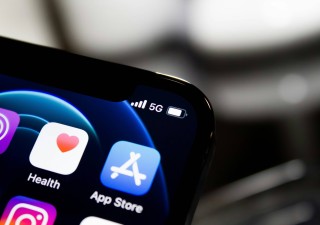How live streaming can expose you to charges of copyright infringement
28 February 2022
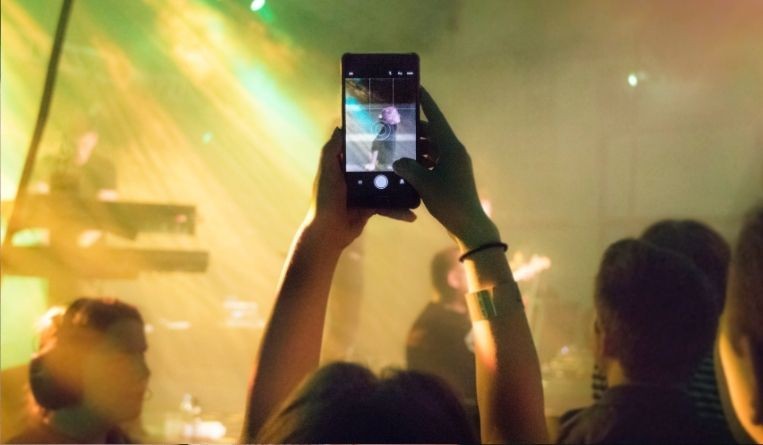
With the number of live streams and videos on different social media platforms increasing dramatically, many celebrities and artists have built a larger engagement with fans, given the massive increase in the number of people tuning into live streams. For instance, when India launched on Instagram, through its Instagram Live feature, a virtual music festival bringing together 14 popular Indian artists, such as Armaan Malik, Lisa Mishra, Naezy, Arjun Kanungo and others, encouraging users to sit in their living rooms and experience live music, the social platform reported a massive 60 percent rise in its live views.
But with such live streams and videos comes social responsibility. As Benjamin Cheong, a partner at Rajah & Tann in Singapore, points out, every country has internet content laws and regulations and the requirements and prohibitions of the laws and regulations in each country are different. While Singapore has the Internet Code of Practice which states that “prohibited material” includes materials that “depicts nudity” and “glorifies, incites or endorses ethnic, racial or religious hatred, strife or intolerance,” Indonesia has the Indonesian Copyright Law which requires a specific permit from the copyright owner or copyright holder because under Article 9 of the Indonesian Copyright law, the owners or the holders are exclusively entitled to an economic right of the creation.
“Given the very nature of live streaming, the person who is doing streaming may inadvertently put out content that is prohibited by law – for example, making a statement that may be seen to be endorsing hatred against a certain race in Singapore,” says Cheong. “Such statements are quickly broadcast and viewed by many users and the person would not be able to retract these statements. The risk of breaching these laws and regulations can be very real. Also, given that the live stream can be viewed by people in other jurisdictions, there is a risk that the person doing the streaming may be in breach of the laws of another country.”
He adds: “For live streaming for e-commerce, it is also important to be aware of advertising and consumer protection laws that may apply. For example, care should be avoided to make any false advertisements or misrepresentations when conducting live streaming.”
For his part, Justisiari Perdana Kusumah, managing partner at K&K Advocates in Jakarta, says, “In an app, like TikTok or Instagram, the act of using or transforming or rearranging or making publicly available to enjoy such as copyright works will be subject to the said copyright law. Therefore, it is compulsory for whoever conducts the streaming or live streaming by using this application to obtain a preliminary permit from the copyright owner or copyright holder.”
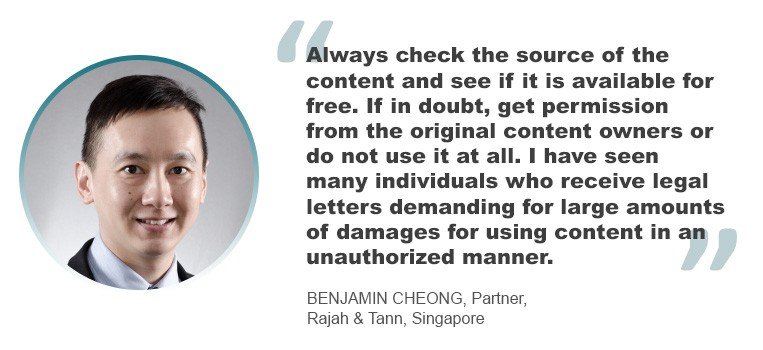
When live streaming
Cheong says that when living streaming, content creators or artists should be aware of the internet content law and regulations of the country and also be familiar with the user terms and conditions of the platform that they are doing the live streaming.
“These will let you know what a person can or cannot do when using their platform, including live streaming on their platforms,” he says. “It is important to be sure that the content that you create is either owned by you, licensed to you or that it is free for use. This is important if you incorporate content made by others in your live stream, such as photos, songs, videos and text.”
He adds that although there is a lot of misconception among internet users about the use of third-party content in their own live stream or content – misconceptions such as if it’s available on the internet, I am free to copy and reuse it or I am not charging for my live stream and therefore it is fine for me to reuse it as I do not make a profit out of it or I am allowed to reuse the content of others as long as I attribute it to the owner of the content –these assumptions may not hold true in all situations and care should be taken before using third-party content.
“Always check the source of the content and see if it is available for free,” he says. “If in doubt, get permission from the original content owners or do not use it at all. I have seen many individuals who receive legal letters demanding for large amounts of damages for using content in an unauthorized manner.”
Kusumah adds that while it is important for the content publisher or parties who wish to conduct a live stream in any application to obtain a preliminary consent as a show of good faith, the content publisher should not wait until being contacted by the owner or holders of the copyrighted works.
“We never know whether they will contact you in order to establish a business proposal, or whether they will contact you as part of their litigious attempt in enforcing their rights,” he says. “The use of such copyrighted works without a proper license or proper permit might expose the content publisher or the parties who conducted the streaming or live streaming to serious legal consequences.”
Once the content creator is using, multiplying the number of creations, adapting, rearranging, transforming, announcing the creation, or communicating the creations in any means, then he is liable for infringement if done without proper consent from the copyright owner.
“That is the parameter that content publishers and live streamers have to fully understand,” Kusumah says. “Once the content publisher finds out they are liable for infringement, I would suggest that the parties or the content publisher contact the relevant owner or holder of the copyrighted works to show good faith and that they take responsibility for their action. If you, for whatever reason, delay such communication with the relevant owner or holder of the copyrighted works, it might expose you to a very serious sanction or fine or even imprisonment, as stipulated under the Indonesian Copyright Law.”
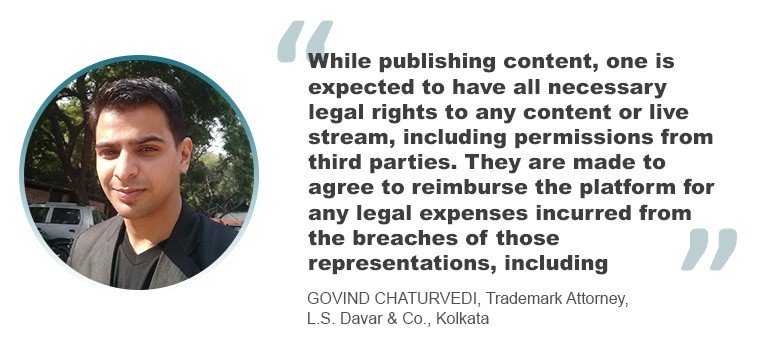
Screen recording and other issues
With the advancement of technology, there are now many ways in which an individual can ‘screen record’ videos, photos or anything else on their phones and laptops. What this screen recording essentially, does is, record whatever is on the screen. At times, the application doing such screen recording also records the sounds played on the phone and stores the final product on the phone for the user to have access to at any point of time.
When an artist or multiple artists perform on Instagram or YouTube live, with the help of such screen recording apps, an individual can, without permission, record the entirety of the performance and save the recording to be uploaded on social media platforms. This clearly violates the copyright vested with the artist over their performance.
“We can understand this more easily by comparing it to when a person attending a concert records the entire concert or parts of the concert to be uploaded on YouTube or Instagram without the permission of the artist or the production company which might own the songs the artist performed during the concert,” says Raghav Malik, a partner at Lall & Sethi in New Delhi. “Such an act would amount to copyright infringement. Similarly, in live videos, when you screen record the artist’s performance, save such video on your device and upload it to Instagram or YouTube, these acts could also amount to infringement. Such upload of content, which is the intellectual property of the artist, the composers, the record label, and being displayed to an audience cannot be considered the creation of the uploader and is copying another individual’s work. This prima facie may be considered a violation of the principles of copyright which requires originality/non-copying for the owner to claim a right over the work.”
He adds that it doesn’t matter whether such screen recording of a live performance was done for non-monetary or non-commercial purposes. Even in these situations, unless permission has been given by the performing artists or the owner of the copyright, the act of screen recording such performances will amount to copyright infringement.
“It is important to note that all these copyright infringement implications pose a big threat to the content creator and, thus, puts the live streaming in a major risk as all the above inferences amount to blatant violation of the basic principles of copyright,” he says. “There are other issues as well, for instance, including the issue of consent, accidentally releasing the content creator’s location, revealing intimate information and not knowing who is watching.”
Instagram’s Terms of Use and Community Guidelines also notes that a user must only post content on Instagram that is non-violative of the copyright or other intellectual property rights of others.
“Perhaps the best mode for ensuring this is by only posting content that is the uploader’s own creation,” says Malik.
Malik notes that even with precautions, there remains a possibility of infringing copyright belonging to someone else while posting video or performing a live stream on Instagram or other social media in the following situations:
- The uploader has purchased or downloaded such content, such as a song from Spotify or Soundcloud;
- The uploader has recorded such content onto their own device;
- The uploader has provided accreditation to the copyright owner;
- The uploader has included a disclaimer citing that no copyright infringement was intended;
- The uploader is unintentionally obtaining profit from such video or streaming;
- The uploader has altered or modified the video or live streaming background or added an original element to the video or live stream;
- The music in the video or background of the live stream has been obtained from the internet; or
- The uploader saw others uploading the same video or performing the stream in a similar manner;
- The uploader thought the action was protected under fair use.
He adds that, therefore, before posting a video or streaming live, one needs to ascertain:
- If he is the creator of such music in the background;
- If he is allowed to use the music included in the video or live stream;
- Whether the use of the music comes within the ambit of exception to copyright infringement; and
- Whether such background music has copyright protection
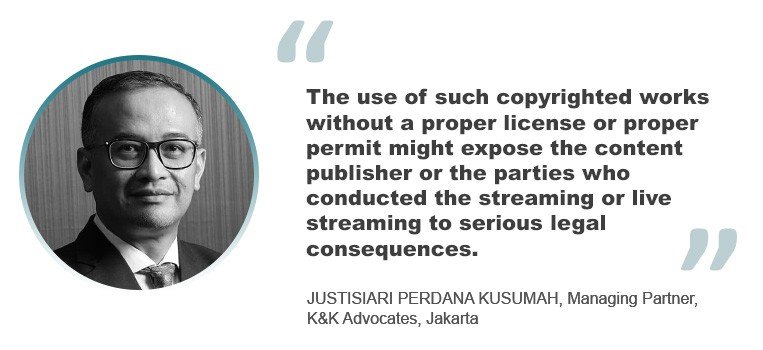
“Generally, it is a good idea to obtain written permission from the author of such music prior to including it on any video or live stream on social media,” says Malik. “The uploader might have the ability to use someone else’s music on the platform if he has obtained permission prior to the inclusion, such as by acquiring a license. The user may also be able to use someone else’s music if the same is in the public domain, and comes under fair use, or is excepted from copyright.”
Other legal issues
Govind Chaturvedi, a trademark attorney at L.S. Davar & Co. in Kolkata, says that whether the live streamer is a professional entertainer or just connecting with friends and family, broadcasting and sharing content online raises many legal issues, including intellectual property, publicity rights, commercial speech, and contractual terms of service.
“Digital content creators should be cautious with what they publish,” he said. “One must be aware of the fact that when they sign up for an online service or platform, they most likely contractually agree to their terms of service, through which they agree to license a host of their legal rights, including copyright, trademark and publicity rights, to the company and affiliate with respect to any content they upload, so that it can be shared and viewed by the platform operators and others users on the platform.”
He adds: “Moreover, while publishing content on such a platform, one is expected to have all necessary legal rights to any content or live stream, including permissions from third parties, and they are made to agree to reimburse the platform for any legal expenses incurred from the breaches of those representations, including unintentional ones. Apart from this, one must avoid the express feature of a third-party trademark in the live stream, and should not indulge in misleading their audience through misrepresentation or deceptive advertisements.”
With the commercial and promotional opportunities for live streaming the events growing along with the popularity of streaming providers, the uncertainty surrounding the raw nature of the content threatens the potential for event planners to incorporate and monetize live stream content in post-event media, sponsorship packages, or other video opportunities.
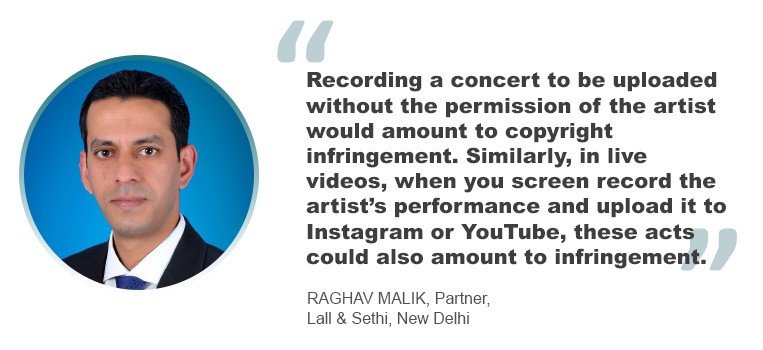
“For events, such as concerts, the legal aspects of streaming one should consider before they start include the consideration of public and private spaces and whether there is the reasonable expectation of privacy, every individual’s right to publicity, and intellectual property, or copyrighted material being captured in the stream,” says Chaturvedi. “The easiest way to go about such streams is to plan ahead in order to make sure that the possibility of infringing and attracting legal consequences is eradicated right in the beginning.”
To best guard oneself against trademark or copyright infringement, he says, a person must check the area that will be visible in their stream for any screens, posters, logos, or artwork and schedule their broadcast keeping in mind the performances, loud music, or sessions that may be covering sensitive material.
“Another thing to be taken into consideration is that areas with a high number of people are avoided so that the attendees who are being streamed are aware of the same. Not having control over the content that’s being instantly transmitted to the trusting followers and potential leads is definitely something to consider, too.”
Excel V. Dyquiangco






